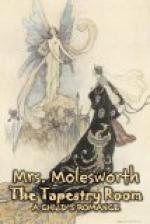“Oh, do let us row on to the island,” said Jeanne eagerly, for by this time the frogs had drawn them to the edge of the lake; there could no longer be any difficulty in rowing for themselves.
“First, any way, we must thank the frogs,” said Hugh, standing up. He would have taken off his cap if he had had one on; as it was, he could only bow politely.
As he did so, each frog turned round so as to face him, and each gave a little bob of the head, which, though not very graceful, was evidently meant as an acknowledgment of Hugh’s courtesy.
“They are very polite frogs,” whispered Hugh. “Jeanne, do stand up and bow to them too.”
Jeanne, who all this time had been sitting with her feet tucked up under her, showed no inclination to move.
“I don’t like to stand up,” she said, “for fear the frogs should run up my legs. But I can thank them just as well sitting down. Frogs,” she added, “frogs, I am very much obliged to you, and I hope you will excuse my not standing up.”
The frogs bowed again, which was very considerate of them; then suddenly there seemed a movement among them, those at the end of the boat drew back a little, and a frog, whom the children had not hitherto specially observed, came forward and stood in front of the others. He was bigger, his colour was a brighter green, and his eyes more brilliantly red. He stood up on his hind legs and bowed politely. Then, after clearing his throat, of which there was much need, for even with this precaution it sounded very croaky, he addressed the children.
“Monsieur and Mademoiselle,” he began, “are very welcome to what we have done for them—the small service we have rendered. Monsieur and Mademoiselle, I and my companions”—“He should say, ’My companions and I,’” whispered Jeanne—“are well brought up frogs. We know our place in society. We disapprove of newfangled notions. We are frogs—we desire to be nothing else, and we are deeply sensible of the honour Monsieur and Mademoiselle have done us by this visit.”
“He really speaks very nicely,” said Jeanne in a whisper.
“Before Monsieur and Mademoiselle bid us farewell—before they leave our shores,” continued the frog with a wave of his “top legs,” as Jeanne afterwards called them, “we should desire to give them what, without presumption, I may call a treat. Monsieur and Mademoiselle are, doubtless, aware that in our humble way we are artists. Our weakness—our strength I should rather say—is music. Our croaking concerts are renowned far and wide, and by a most fortunate coincidence one is about to take place, to celebrate the farewell—the departure to other regions—of a songster whose family fame for many ages has been renowned. Monsieur and Mademoiselle, to-night is to be heard for the first time in this century the ‘Song of the Swan.’”
“The song of the swan,” repeated Hugh, rather puzzled; “I didn’t know swans ever sang. I thought it was just an old saying that they sing once only—when they are dying.”




